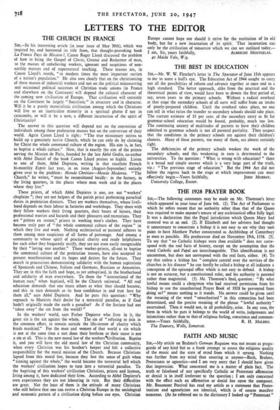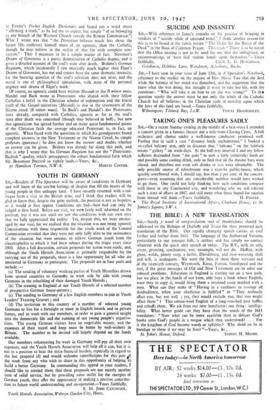FAITH AND MUSIC
SIR, My article on Brahms's German Requiem was not meant as propa- ganda of any kind but as a frank attempt to assess the religious quality of the music and the state of mind from which it sprang. Nothing was further from my mind than sneering at anyone—Bach, Brahms, Protestants or agnostics—and I am very sorry that I should have given that impression. What concerned me is a matter of plain fact. The truth or falsehood of any specifically Catholic or Protestant affirmation or denial is in itself irrelevant to the question ; I am only concerned with the effect such an affirmation or denial has upon the composer. Mr. Beaumont Percival has read my article as a statement that Protes- tantism and agnosticism are identical, which is of course manifest nonsense. (As he referred me to the dictionary I looked up "Protestant " in Fowler's Pocket English Dictionary and found not a word about " affirming a truth," as he led me to expect, but simply " of or belonging to any branch of the Western Church outside the Roman Communion.") What I wrote was that " the Protestant believes much less about the future life, confesses himself more of an agnostic, than the Catholic, though he may believe in the reality of that life with complete con- viction." That I maintain to be a simple matter of fact. Newman's Dream of Gerontius is a poetic dramatisation of Catholic dogma, and it gives a detailed account of the soul's state after death. Brahms's German Requiem, which incidentally I rate musically much higher than Elgar's Dream of Gerontius, has not and cannot have the same dramatic intensity, for the burning question of the soul's salvation does not arise, and the mood is one of philosophical speculation, with none of the personal urgency and drama of Elgar's work.
Of course, no agnostic could have written Messiah or the B minor mass. Handel and Bach wrote as Protestants who shared with their fellow Catholics a belief in the Christian scheme of redemption and the literal truth of the Gospel narratives (Messiah) as also in the statements of the Nicene creed (B minor mass). In Bach's and Handel's day Protestants were already, compared with Catholics, agnostic as far as the soul's state after death was concerned (though they believed in hell) ; but now that agnosticism has spread further and on many quite fundamental points of the Christian faith the average educated Protestant is, in fact, an agnostic. When faced with the questions to which his grandparents found complete answers in the New Testament or the Nicene Creed, he simply professes ignorance ;' he does not know the answer and doubts whether an answer can be given. Brahms was already far along this path, and that is why I wrote that his German Requiem has not the " Protestant- Bachish " quality, which presupposes the robust fundamental faith which Mr. Beaumont Percival so rightly lauds.—Yours, &c.,



































 Previous page
Previous page